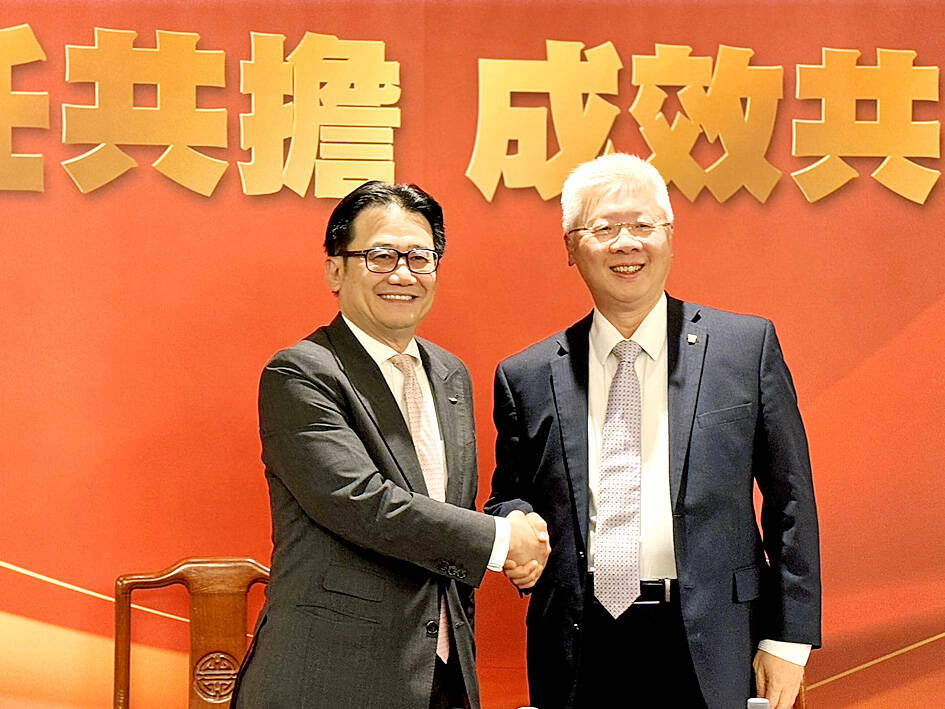Taishin Financial Holding Co (台新金控) and Shin Kong Financial Co (新光金控) yesterday jointly said they were confident their proposed merger would win approvals at their respective shareholders’ meetings tomorrow, ushering in a new era for both entities.
Taishin Financial president Welch Lin (林維俊) and Shin Kong Financial president Stephen Chen (陳恩光) made the announcement during a media briefing in Taipei.
Foreign institutional investors would largely support the merger and more than 70 percent would take part in the shareholders’ meetings to show their support, Lin said.

Photo: Kelson Wang, Taipei Times
“The turnout this time would surpass my expectation,” said Lin, who recently finished roadshows to drum up support for the merger.
Foreign institutional investors placed great importance on the merger plan, which would create substantial synergies for life insurance-oriented Shin Kong Financial and bank-focused Taishin Financial, Lin said.
The two companies would hold their respective shareholders’ meetings tomorrow and would file the merger application with the Financial Supervisory Commission on Friday, Lin said.
Taishin Financial has proposed to carry out the merger through share swap arrangements, where one Shin Kong share would be traded for 0.672 Taishin Financial common shares and 0.175 Taishin Financial preferred shares.
The preferred shares would receive an annual interest rate of 1.665 percent before their buyback three years later.
The scheme would suggest a merger price of NT$14.18 (US$0.44) per share, or a 17.67 percent premium based on Shin Kong’s closing price of NT$12.05 on the main board yesterday.
Taishin Financial would be the surviving entity, Shin Kong Financial would be delisted and the new conglomerate would be named Tashin Shin Kong Financial Holding Co (台新新光金控), Lin said, adding that it would become Taiwan’s fourth-largest financial conglomerate based on assets.
The merger would bolster bilateral life insurance and banking businesses, and shore up bilateral securities operations, he said.
Taishin Financial would address the commission’s concern over the capital strength of Shin Kong Life Insurance Co (新光人壽), the main subsidiary of Shin Kong Financial, Lin said.
As of June 30, Taishin Financial has a capital adequacy ratio of 120 percent and double-leverage ratio of 113 percent, and is ready for capital increases to support Shin Kong Life if necessary, he said.
The readings at Shin Kong Financial would improve after the proposed merger, Lin added.
However, Shin Kong Financial’s majority shareholder and former board director Lin Po-han (林伯翰) has vehemently opposed the merger and asked like-minded shareholders to reject the proposal to ensure that Shin Kong Financial would continue to exist.

GROWING OWINGS: While Luxembourg and China swapped the top three spots, the US continued to be the largest exposure for Taiwan for the 41st consecutive quarter The US remained the largest debtor nation to Taiwan’s banking sector for the 41st consecutive quarter at the end of September, after local banks’ exposure to the US market rose more than 2 percent from three months earlier, the central bank said. Exposure to the US increased to US$198.896 billion, up US$4.026 billion, or 2.07 percent, from US$194.87 billion in the previous quarter, data released by the central bank showed on Friday. Of the increase, about US$1.4 billion came from banks’ investments in securitized products and interbank loans in the US, while another US$2.6 billion stemmed from trust assets, including mutual funds,

AI TALENT: No financial details were released about the deal, in which top Groq executives, including its CEO, would join Nvidia to help advance the technology Nvidia Corp has agreed to a licensing deal with artificial intelligence (AI) start-up Groq, furthering its investments in companies connected to the AI boom and gaining the right to add a new type of technology to its products. The world’s largest publicly traded company has paid for the right to use Groq’s technology and is to integrate its chip design into future products. Some of the start-up’s executives are leaving to join Nvidia to help with that effort, the companies said. Groq would continue as an independent company with a new chief executive, it said on Wednesday in a post on its Web

Even as the US is embarked on a bitter rivalry with China over the deployment of artificial intelligence (AI), Chinese technology is quietly making inroads into the US market. Despite considerable geopolitical tensions, Chinese open-source AI models are winning over a growing number of programmers and companies in the US. These are different from the closed generative AI models that have become household names — ChatGPT-maker OpenAI or Google’s Gemini — whose inner workings are fiercely protected. In contrast, “open” models offered by many Chinese rivals, from Alibaba (阿里巴巴) to DeepSeek (深度求索), allow programmers to customize parts of the software to suit their

JOINT EFFORTS: MediaTek would partner with Denso to develop custom chips to support the car-part specialist company’s driver-assist systems in an expanding market MediaTek Inc (聯發科), the world’s largest mobile phone chip designer, yesterday said it is working closely with Japan’s Denso Corp to build a custom automotive system-on-chip (SoC) solution tailored for advanced driver-assistance systems and cockpit systems, adding another customer to its new application-specific IC (ASIC) business. This effort merges Denso’s automotive-grade safety expertise and deep vehicle integration with MediaTek’s technologies cultivated through the development of Media- Tek’s Dimensity AX, leveraging efficient, high-performance SoCs and artificial intelligence (AI) capabilities to offer a scalable, production-ready platform for next-generation driver assistance, the company said in a statement yesterday. “Through this collaboration, we are bringing two